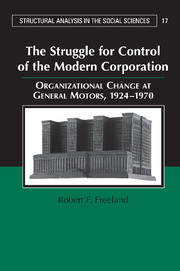 The Struggle for Control of the Modern Corporation
The Struggle for Control of the Modern Corporation Published online by Cambridge University Press: 05 August 2011
The General Motors case raises important questions concerning the governance of the modern corporation. Clearly, the modifications to the M-form that were in place through most of GM's history did not arise out of ignorance or error, nor did they necessarily lead to suboptimal performance. Instead, such changes were introduced as a way of creating and maintaining cooperation and order within the firm. This chapter examines the implications of the GM case for organizational analysis and the theory of the firm. I begin by addressing the changing role of owners in the modern corporation. I argue that the M-form was originally created as a means of ensuring continuing owner control in the face of the ongoing growth and differentiation between the functions of ownership and management. Yet its efficacy as an instrument of owner control was predicated on assumptions that became increasingly problematic over time. Using the Du Pont–GM relationship as a starting point, I seek to understand the conditions under which shareholders can exert effective control over corporate governance. In the second half of the chapter I turn to the relation between general office and divisions in the M-form, contrasting efficiency accounts with an approach emphasizing the role of consent in corporate governance. I argue that these two types of explanations invoke very different understandings of cooperative action that raise important theoretical and practical questions concerning the relationships among consent, information, order, and efficiency in corporate governance.
To save this book to your Kindle, first ensure [email protected] is added to your Approved Personal Document E-mail List under your Personal Document Settings on the Manage Your Content and Devices page of your Amazon account. Then enter the ‘name’ part of your Kindle email address below. Find out more about saving to your Kindle.
Note you can select to save to either the @free.kindle.com or @kindle.com variations. ‘@free.kindle.com’ emails are free but can only be saved to your device when it is connected to wi-fi. ‘@kindle.com’ emails can be delivered even when you are not connected to wi-fi, but note that service fees apply.
Find out more about the Kindle Personal Document Service.
To save content items to your account, please confirm that you agree to abide by our usage policies. If this is the first time you use this feature, you will be asked to authorise Cambridge Core to connect with your account. Find out more about saving content to Dropbox.
To save content items to your account, please confirm that you agree to abide by our usage policies. If this is the first time you use this feature, you will be asked to authorise Cambridge Core to connect with your account. Find out more about saving content to Google Drive.